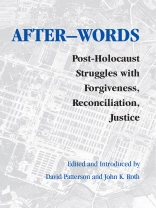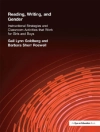More than fifty years after it ended, the Holocaust continues to leave survivors and their descendants, as well as historians, philosophers, and theologians, searching for words to convey the enormity of that event. Efforts to express its realities and its impact on successive generations often stretch language to the breaking point–or to the point of silence. Words whose meaning was contested before the Holocaust prove even more fragile in its wake.
David Patterson and John K. Roth identify three such ‘after-words’: forgiveness, reconciliation, and justice. These words, though forever altered by the Holocaust, are still spoken and heard. But how should the concepts they represent be understood? How can their integrity be restored within the framework of current philosophical and, especially, religious traditions? Writing in a format that creates the feel of dialogue, the nine contributors to After-Words tackle these and other difficult questions about the nature of memory and forgiveness after the Holocaust to encourage others to participate in similar inter- and intrafaith inquiries.
The contributors to After-Words are members of the Pastora Goldner Holocaust Symposium. Led since its founding in 1996 by Leonard Grob and Henry Knight, the symposium’s Holocaust and genocide scholars–a group that is interfaith, international, interdisciplinary, and intergenerational–meet biennially in Oxfordshire, England.
Inhoudsopgave
Prologue: ‘Did you say: after? Meaning what?’–David Patterson and John K. Roth
Part One: Forgiveness
1/ Forgiveness, Reconciliation, and Jewish Memory after Auschwitz–Peter J. Haas
In Response:
–Rachel N. Baum
–Leonard Grob
–Peter J. Haas
2/ The Face of Forgiveness in a Post-Holocaust World–Henry F. Knight
In Response:
–Britta Frede-Wenger
–David Patterson
–Henry F. Knight
3/ Forgiveness after the Holocaust–Didier Pollefeyt
In Response:
–Peter J. Haas
–Juergen Manemann
–Didier Pollefeyt
Part Two: Reconciliation
4/ Useless Experience: Its Significance for Reconciliation after Auschwitz–John K. Roth
In Response:
–Rachel N. Baum
–Didier Pollefeyt
–John K. Roth
5/ Anthropological Remarks on Reconciliation after Auschwitz–Britta Frede-Wenger
In Response:
–Juergen Manemann
–Didier Pollefeyt
–Britta Frede-Wenger
6/ Struggles for Recognition in an Era of Globalization: The Necessity of a Theology of Reconciliation from a Political-Theological Perspective after Auschwitz–Juergen Manemann
In Response:
–Peter J. Haas
–David Patterson
–Juergen Manemann
Part Three: Justice
7/ G-d, World, Humanity: Jewish Reflections on Justice after Auschwitz–David Patterson
In Response:
–Britta Frede-Wenger
–John K. Roth
–David Patterson
8/ The Israeli-Palestinian Conflict: Just Reconciliation in the Shadows of the Holocaust–Leonard Grob
In Response:
–Henry F. Knight
–John K. Roth
–Leonard Grob
9/ The Post-Holocaust Jewish Heart–Rachel N. Baum
In Response:
–Leonard Grob
–Henry F. Knight
–Rachel N. Baum
Postscript: An After That is Yet to Be–David Patterson and John K. Roth
Bibliography
About the Editors and Contributors
Index
Over de auteur
Edward J. Sexton Professor Emeritus of Philosophy and Founding Director of the Center for the Study of the Holocaust, Genocide, and Human Rights (now the Mgrublian Center for Human Rights), Claremont Mc Kenna College. Roth has published hundreds of articles and reviews and authored, co-authored, or edited more than fifty books, including The Oxford Handbook of Holocaust Studies (Oxford University Press, 2010), Encountering the Stranger: A Jewish-Christian-Muslim Trialogue (University of Washington Press, 2012), Rape: Weapon of War and Genocide (Paragon House, 2012), and The Failures of Ethics: Confronting the Holocaust, Genocide, and Other Mass Atrocities (Oxford University Press, 2015). He is a co-editor of our Stephen S. Weinstein Series in Post-Holocaust Studies












